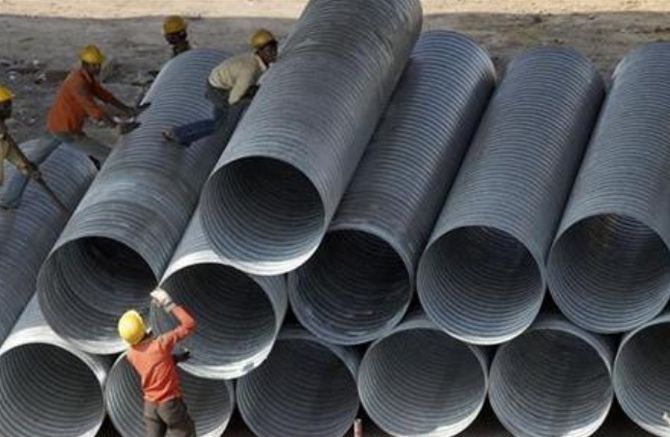Once Bhushan Steel is into its fold, Tata Steel will increase its capacity from 12.7 million tonnes per annum (mtpa) to 18.3 mtpa

Tata Steel seems to be closing in on Sajjan Jindal-promoted JSW Steel and, with a bit of luck in the National Company Law Tribunal (NCLT), could become the country’s largest steelmaker for the first time.
Just a week ago, the Tata group company was declared a successful resolution applicant by the committee of creditors (CoC) of Bhushan Steel for buying out its stressed assets.
The decision is yet to be cleared by the NCLT.
Once Bhushan Steel is into its fold, Tata Steel will increase its capacity from 12.7 million tonnes per annum (mtpa) to 18.3 mtpa.
That is pretty close to the 19.5 mtpa capacity of JSW, which has got an informal nod from the CoC to buy out Monnet Ispat & Energy, for which it was the sole bidder with private equity fund AION.
The NCLT, Mumbai, has, however, stayed the creditors’ meet to put the resolution plan to vote till April 3.
Yet that equation could change, depending on the final call on who grabs Bhushan Power & Steel.
The Tatas are again the highest bidder, leaving behind their arch-rival JSW.
But, putting a spanner in the works is the UK-based Liberty House, which also made a bid for the company after the deadline and has questioned the decision of the CoC to reject its bid.
It has taken up the issue with the NCLT. If the decision goes in the Tatas’ favour, Tata Steel would add another 3 mtpa of capacity, making it the largest domestic steel player.
That is not the only good news. Sale of stressed assets will also lead to a substantial consolidation of the steel business with lesser players in the field.
The five stressed steel companies constitute around 17 per cent of overall steel capacity and 12 per cent of the output.
But after the asset sale, the nine big players in the business will shrink to four - Tata Steel, JSW, SAIL, and JSPL.
The old boys who will no longer be there to run their steel business will include the promoters of Bhushan Steel, Bhushan Power & Steel, Monnet Ispat, Electrosteel, and Essar Steel.
However, two new players will join this group - it could include either ArcelorMittal or Russian VTB group, which have bid for Essar Steel, and Vedanta, which is the highest bidder for Electrosteel.
These six steel players will now control over 60 per cent of the domestic steel capacity, up from 40 per cent before the asset sale.
The consolidation will be more pronounced in flat steel, where they will command over 90 per cent of the capacity.
Experts say the consolidation will help enhance domestic pricing power and prevent marginal players from undercutting steel prices to stay afloat.
Credit Suisse in its report argues that consolidation should provide stability in profits, and possibly some improvement as well for the flats segment: JSW and Tata Steel have the highest share of output as flats, and thus are best placed to benefit from this trend.
In a market expected to grow at 4-8 per cent a year for the foreseeable future, this consolidation is an important reason as to why JSW and Tata can continue to trade at a premium to global peers.
But the great steel asset sale could also bring in at least one new big global steel player in the business, ArcelorMittal, which despite being the world’s largest steel player has made numerous aborted attempts to get into the country.
With a 10 mtpa plant under its belt, if it wins Essar, the company plans to ramp up its capacity to 18 mtpa.
“ArcelorMittal will bring its scale and command of technology and will surely be a key player in the market in India. It also has a tie-up with Nippon Steel and has a good track record in running plants together,” says Jayanta Roy, senior vice-president of Icra.
VTB Capital, on the other hand, is a private equity fund, which has worked with various stressed steel firms in Russia, and has also funded Rosneft to buy out the Ruia-run Essar Oil business.
If VTB wins the race, it will be its maiden entry in the sector in India.
Photograph: Babu/Reuters











